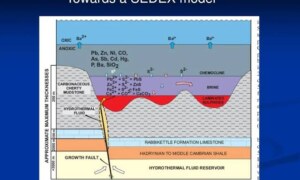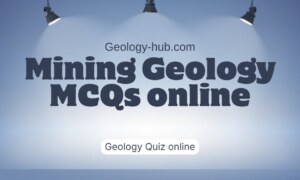What is VMS?
Assemblages of mostly sulfide minerals that develop on the seafloor at locations of concentrated hydrothermal discharge, relates to a kind of ore deposit that’s mined from existing oceanic crust formed underwater are Volcanogenic Massive Sulfides (VMS) Deposit.
Introduction to VMS
Mineral accumulations known as volcanogenic massive sulfide (VMS) deposits occur on or close to the seafloor at locations where hydrothermal vent fluid discharge occurs at high temperatures. When high-temperature, metal- and sulfur-rich fluids interact with cold seawater at hydrothermal vents (such as black and white smokers), dominantly sulfide minerals precipitate to produce the deposits. VMS deposits typically occur in subduction-related environments including volcanic arcs and back-arc basins as well as at subsurface tectonic plate boundaries like mid-ocean ridges.
THE GEOLOGICAL NATURE OF VMS
Typically found near the boundaries of tectonic plates in regions of volcanic and/or seismic activity, deposits of volcanic massive sulfide (VMS) are formed in conjunction with submarine volcanic activity. The deposits are frequently linked to back-arc basins or ancient island arcs where subduction-related volcanism has altered the seafloor.
Rhyolitic volcanic rocks, marine sedimentary rocks, and volcanic rocks ranging from basaltic to andesitic are among the rocks that typically host VMS deposits. They are frequently found in geological terranes called greenstone belts, which are connected to old volcanic arcs and comprise a range of volcanic and sedimentary rocks.
Hydrothermal vents, sometimes known as “black smokers,” are features of the seafloor that contribute to the geologic setting of VMS deposits. These vents emit hot, metal-rich fluids into the ocean. Minerals are deposited in and around the vents as a result of these fluids’ reactions with the surrounding rocks and ocean. Seafloor massive sulfides (SMS) and underwater exhalative deposits are two more forms of mineral deposits that may be connected to the deposits. The deposits may occur in clusters or “fields” along submarine volcano chains.
FORMATION PROCESSES AND MINERALOGY
Hydrothermal fluids produced by volcanic activity are the source of volcanogenic massive sulphide (VMS) deposits. The fluids are frequently released by undersea volcanic vents and are rich in metals and sulphur. The heated fluids cool quickly upon coming into contact with the cold ocean, which precipitates the metals and sulfur and forms mineral deposits.
The mineralogy of VMS deposits is diverse, containing a wide variety of minerals. Usually, gangue minerals such as pyrite, quartz, and feldspar are combined with layers of metal sulfides like chalcopyrite, sphalerite, and galena in the deposits. Significant concentrations of gold and silver, together with trace levels of cobalt, nickel, and tin, are also possible in the deposits.
Historical significance in mining
Throughout history, VMS deposits have been a significant supplier of basic and precious metals. They have been mined for copper and silver since antiquity, and throughout the Bronze Age, they were a significant supply of copper. For instance, mining operations at the Rio Tinto mine in Spain date back to the third century BCE, and the mine has been in operation for more than 5,000 years.
In the contemporary age, VMS deposits were a prominent focus of twentieth-century mineral exploration, especially in the 1960s and 1970s. During this time, many of the world’s largest VMS deposits were found, and they remain significant suppliers of base and precious metals to this day.
CHARACTERISTICS OF VMS DEPOSITS
Major supplies of zinc, copper, lead, silver, and gold are found in volcanogenic (volcanic) massive sulfide (VMS) deposits. They are categorised based on the amount of base metals present and usually appear as lenses of polymetallic massive sulfide that grow on the seafloor in underwater volcanic settings. They arise from brines that are rich in metals and connected to hydrothermal convection on the seafloor. Rocks that are their immediate host may be sedimentary or volcanic. VMS deposits remain one of the most sought-after deposit kinds for protection against shifting metal prices due to their polymetallic composition. Almost 850 deposits are known to exist globally were forms of VMS deposits have one thing in common: they were developed in environments of extensional tectonics, which includes both oceanic seafloor spreading and back arc settings. The deposit clusters that are generated within rifts or calderas define most, but not all, of the major VMS mining areas. Another explanation for their clustering is the existence of a shared heat source that sets off extensive sub-seafloor fluid convection networks. Through magmatic devolatilization, these subvolcanic intrusions may also provide metals to the VMS hydrothermal systems. Large-scale fluid movement is the cause of the widespread semi-conformable zones of hydrothermal alteration that occur in VMS mining districts. These zones intensify into zones of discordant alteration in the immediate footwall and hanging wall of particular deposits. The presence of thin, but relatively large, units of ferruginous chemical sediment created by fluid exhalation and the dispersal of hydrothermal particles is another characteristic of VMS camps.
Two components make up the majority of VMS deposits Usually, there is a strata bound, mound-shaped to a tabular body made mostly of quartz, subordinate phyllosilicates, iron oxide minerals, and altered silicate wall-rock, with a mass of sulphur dioxide exceeding 40%. Usually, dispersed sulfides and discordant to semi-concordant stock work veins underlie these strata-bound entities. Distinct alteration halos encircling the stock-work vein networks, or “pipes,” may reach into the hanging-wall layers above the VMS deposit VMS deposits continue to occur on the seafloor now, having done so for the entirety of geological history. There are a few well-known deposits that you may be familiar. They are dispersed around the globe. Firstly, the development of an active VMS black smoker on the seafloor’s oceanic crust (excellent rock crusher). A portion of the metals are derived from the magma chamber beneath the surface, but when the hydrothermal fluids rise above the hot magma, they draw in cool seawater. This water is subsequently heated and combines with the magnetic water as it rises to the vent and returns to the sea, creating massive circulation cells that could span several kilo metres. The remaining metal inputs come from the passage of saltwater through the host volcano. the formation of VMS Leaching base metals, sulfur, and metals, especially iron, from the volcanic rock. The hydrothermal fluids—volcanic and recycled seawater—have extremely low metal concentrations—a few parts per per cent.
Below the seafloor, there is a neck of fractured rock that is caused by the hot fluids violently boiling under pressure. This neck is then topped by a series of chimneys that let the fluid escape into the cold sea. The temperature at the bottom of the thermocline is extremely cold; even in tropical regions, it is frequently only a few degrees above freezing. An exhalative length of sulfuric material builds on the floor around the chimney. When the hydrothermal fluid hits the whole seafloor, it quickly cools down, which is the key to the ore’s high quality.
VMS Deposits classifications
Volcanogenic massive sulfide (VMS) deposits are categorized into many kinds according to their mineralogy and geologic context. Here are a few examples of popular types:
- Bimodal VMS Deposits: These deposits are formed in volcanic environments that are characterized by the presence of both mafic and felsic rocks. The mafic rocks are usually basaltic and the felsic rocks are usually rhyolitic or dacitic.
- Felsic VMS Deposits: These deposits are formed in volcanic environments that are dominated by felsic rocks, such as rhyolite and dacite.
- Mafic VMS Deposits: These deposits are formed in volcanic environments that are dominated by mafic rocks, such as basalt.
- Sedimentary Exhalative (SEDEX) VMS Deposits: These deposits are formed in sedimentary basins and are associated with the discharge of hydrothermal fluids through sedimentary rocks.
- Cyprus Type VMS Deposits: These deposits are named after the massive sulfide deposits in Cyprus, which are formed in submarine volcanic environments and are associated with ophiolites (segments of oceanic crust).
- Kuroko Type VMS Deposits: These deposits are named after the massive sulfide deposits in Japan’s Kuroko mine, which are formed in submarine volcanic environments and are characterized by their high content of zinc, lead, and copper.
- Algoma Type VMS Deposits: These deposits are named after the massive sulfide deposits in Canada’s Algoma district, which are formed in submarine volcanic environments and are characterized by their high content of copper.


Leave a comment